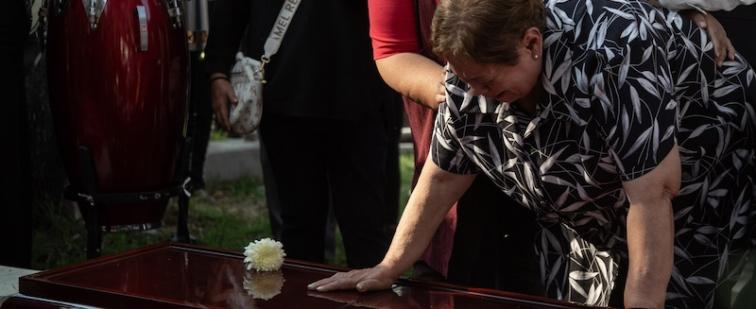Home
Brazil lags far behind her left-leaning neighbors in government initiatives that bring privatized national resources back into the public domain. In recent months, however, Brazil’s Landless Workers’ Movement (MST) and other groups have launched mass actions that demand similar moves toward national resource sovereignty. The MST’s recent triple occupation of Brazil’s Companhia Vale do Rio Doce (CVRD), the largest iron ore exporter in the world, is seen by some as the opening salvo in these new efforts.
As disgraced former president Alberto Fujimori goes on trial in Lima, Peru, for human rights atrocities, the National Security Archive posted a declassified Defense Intelligence Agency cable [PDF] tying him directly to the executions of unarmed rebels who had surrendered after the seizure of the residence of Japanese ambassador in 1997. “President Fujimori issued the order to ‘take no prisoners,’” states the secret “roger channel” intelligence cable. “Because of this even MRTA [Tupac Amaru Revolutionary Movement members] who were taken alive did not survive the rescue operation.”
 Chávez holding Venezuela's 1999 constitution. (ABr, CC) |
How should the narrow defeat of the referendum to amend Venezuela’s 1999 constitution be interpreted? Does the fact that 50.7% of voters rejected the omnibus package of 69 proposed constitutional amendments indicate that Venezuelans as a whole are tired of Chávez and wary of going any further along the path towards “socialism of the twenty-first century”?
 Evo Morales, Photo: ABI. Evo Morales, Photo: ABI. |
Nearly two years into the presidency of Evo Morales, government officials and leftist social organizations are determined to break with the past and transform the nation. The opposition calls it a civil war. The government calls it a revolution. Other Bolivian activists and analysts call it business as usual. A look at public opinion and recent conflicts in Bolivia exposes the challenges facing Bolivia's first indigenous president.
As tourism continues to grow into one of the most profitable sectors of Puerto Rico’s economy, many small communities have found themselves threatened by development companies. The small coastal village of Piñones, just outside the town of Loíza, has managed to defend itself from the designs of PFZ Properties, which belongs to a Puerto Rican developer named Joel Katz, an entrepreneur known to be close to the inner circles of the Partido Popular Democrático. “If there are still natural resources in Piñones, it’s because of the community,” says Milagros Quiñones, a local activist.
Since 1901, when the first duties between puerto Rico and the United States were abolished, the island’s economy has served as a kind of experiment in what we today call neoliberalism. Puerto Rico has long been notable for its deep integration into the North American system, the maximal fluidity of labor and capital flows between it and the U.S. mainland, and its dependence on U.S. imports. This century-old brand of colonial capitalism has been adjusted and readjusted over the years, often in response to system-wide shocks—most recently and dramatically in 2006, when the insular government ran out of money and temporarily laid off about 80,000 public employees.
A long hunger strike by five Mapuche political prisoners in Chile, sustained by a significant amount of solidarity, seems to be evidence of the deepening of a people’s long struggle for the recovery of lands and control over territory.
“We denounce that Chile is the only country in Latin America where members of an indigenous group fighting for its rights are persecuted and jailed ...”
Editor's Note: With solidarity from landless and campesino movements, indigenous Tupinikim and Guarani communities in the Brazilian state of Espírito Santo have successfully reclaimed their land from Aracruz Celulose S.A., a mammoth multinational cellulose company that illegally appropriated it in the 1970s. A NACLA investigation supported by the Samuel Chavkin Investigative Journalism Fund finds that the growing unity of various factions of rural civil society, and their increasing militancy—especially as manifested in the tactic of nonviolent occupations—have greatly boosted the indigenous struggle.
Wal-Mart's aggressive efforts to keep labor unions out of stores worldwide have come under fire across the hemisphere. Workers report how the retail chain systematically violates international labor laws protecting workers' rights to free association and union organizing. As the world's largest private employer, Wal-Mart has set a precedent for bad working conditions for employees in the United States and abroad.
In recent years, grassroots media have been critical to social uprisings throughout Latin America. The short-lived coup against Venezuela’s Hugo Chávez would have turned out quite differently if not for community outlets breaking the information blockade imposed by anti-government corporate media. Grassroots radio has served as the central nervous system of Bolivia’s massive rural-urban uprisings, and Ecuador’s call-in radio station Radio Luna was instrumental in the overthrow of former president Lucio Gutiérrez. Even in the United States, Latino media have been key to filling the streets. But the use of media in the 2006 uprising in Oaxaca, Mexico, stands apart. There, activists didn’t just use the media; they expropriated them.











